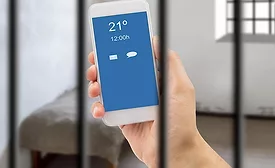Home » Keywords: » correctional facility security
Items Tagged with 'correctional facility security'
ARTICLES
Partnering Efficiency and Synergy
Teaching an Old Partnership Tradition New Tricks
May 1, 2012
Sign-up to receive top management & result-driven techniques in the industry.
Join over 20,000+ industry leaders who receive our premium content.
SIGN UP TODAY!Copyright ©2026. All Rights Reserved BNP Media.
Design, CMS, Hosting & Web Development :: ePublishing


